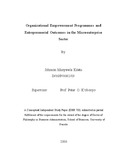| dc.description.abstract | Empowerment at individual level is the art of increasing the competency and
capability of others by endowing them with a sense of self-worth and potency. At
organizational level, empowerment aims at enhancing participation of all stakeholders in
the achievement of individuals' and organizational goals. The individual aspect of
empowerment is well researched, but little has been done on organizational
empowerment. Empowerment is an open-ended construct that takes different forms in
different contexts amongst different people, hence the need for contingency studies
(Zimmerman, 1993; Perkins, 1993). One on the areas where the role of empowerment is
required is in microenterprise sector. Despite the significant role this sector is playing in
economic development In developing countries, it has remained bounded,
underdeveloped and dominated by outdated traditional management practices. As a
result, entrepreneurs end up wasting massive investment as their enterprises die
prematurely. Employees join the sector for diverse reasons or because they are displaced
by the formal employment sector whose growth has taken a negative trend.
Previous studies on microenterprises focused on the role of technical skills,
entrepreneurs' demographic factors, financial factors, infrastructural factors, policy
issues, ownership arrangements, networks, linkages, cultural practices and market
structures. Much less has been done about organizational development components and
the role of human agency in enhancing microenterprise performance. Attempts to resolve
the microsector problems have not yielded the desired outcomes. Increasingly, the role of
organizational development programmes within the micro and small scale enterprises
sector is being recognized as a positive direction for the bounded sector (Kamoche,
2000). The questions to be resolved by this conceptual independent paper are: how
should empowerment studies in the microenterprise sector conducted? What literature
would advise empowerment studies in this bounded sector? What has or not been
studied? Are there controversies that surround empowerment studies and how have they
been resolved? What is the most appropriate empowerment conceptual framework for
micro and small scale enterprise in Kenya? | en |

